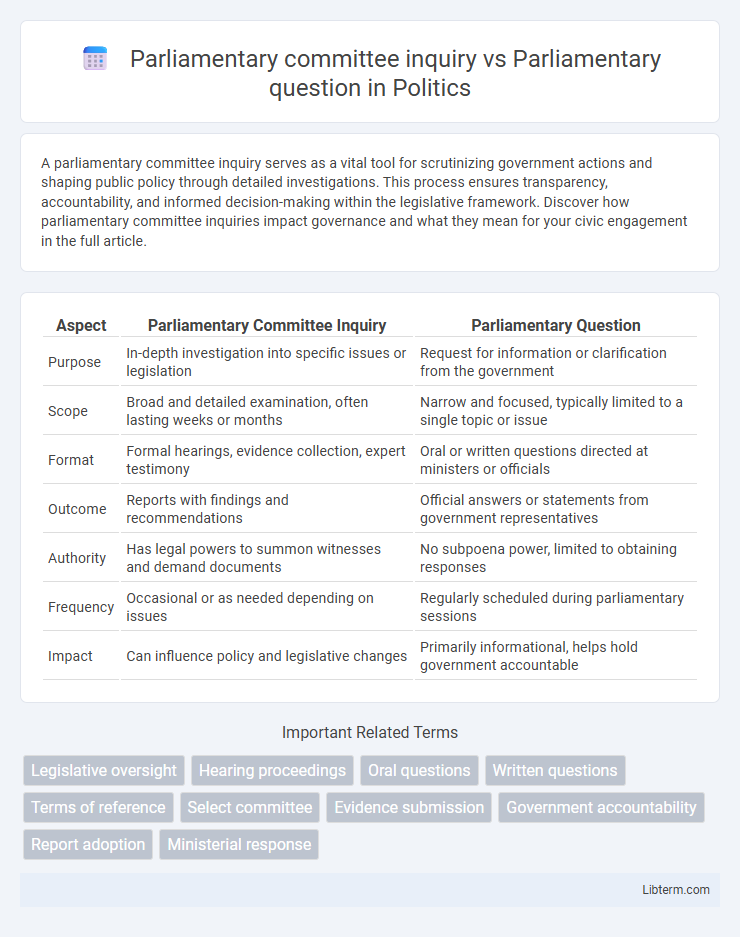A parliamentary committee inquiry serves as a vital tool for scrutinizing government actions and shaping public policy through detailed investigations. This process ensures transparency, accountability, and informed decision-making within the legislative framework. Discover how parliamentary committee inquiries impact governance and what they mean for your civic engagement in the full article.
Table of Comparison
| Aspect | Parliamentary Committee Inquiry | Parliamentary Question |
|---|---|---|
| Purpose | In-depth investigation into specific issues or legislation | Request for information or clarification from the government |
| Scope | Broad and detailed examination, often lasting weeks or months | Narrow and focused, typically limited to a single topic or issue |
| Format | Formal hearings, evidence collection, expert testimony | Oral or written questions directed at ministers or officials |
| Outcome | Reports with findings and recommendations | Official answers or statements from government representatives |
| Authority | Has legal powers to summon witnesses and demand documents | No subpoena power, limited to obtaining responses |
| Frequency | Occasional or as needed depending on issues | Regularly scheduled during parliamentary sessions |
| Impact | Can influence policy and legislative changes | Primarily informational, helps hold government accountable |
Introduction to Parliamentary Oversight Mechanisms
Parliamentary committee inquiries serve as in-depth investigations conducted by specialized committees to scrutinize government actions, policies, and administration, promoting transparency and accountability. Parliamentary questions, in contrast, are formal queries posed by members of parliament to ministers, seeking specific information or explanations on government activities. Both tools are fundamental components of parliamentary oversight mechanisms, enabling legislators to monitor executive performance and ensure effective governance.
Overview of Parliamentary Committees
Parliamentary committees are specialized bodies responsible for detailed examination of legislation, government policies, and public administration, providing oversight and ensuring accountability. Committees conduct inquiries by gathering evidence, questioning witnesses, and producing reports that guide parliamentary decisions and public policy. Parliamentary questions, by contrast, are direct queries raised by members within the chamber to hold the government accountable during sessions, often drawing on findings from committee inquiries for depth and context.
Structure and Process of Parliamentary Committee Inquiries
Parliamentary committee inquiries involve a structured process where a specialized committee is appointed to investigate specific issues, gather evidence, and produce detailed reports with recommendations. These inquiries follow formal procedures including calling witnesses, reviewing documents, and holding public or private hearings to ensure thorough examination and accountability. In contrast, parliamentary questions are brief, direct inquiries posed by members of parliament during sessions to seek immediate information or clarify government actions without the elaborate investigative framework of committee inquiries.
Definition and Purpose of Parliamentary Questions
Parliamentary questions are formal inquiries posed by members of parliament to government ministers, aiming to obtain information or prompt accountability on specific policies or administrative actions. They serve to enhance government transparency and provide a direct mechanism for legislators to scrutinize executive decisions during parliamentary sessions. Unlike parliamentary committee inquiries, which involve detailed investigations by specialized groups, parliamentary questions focus on immediate clarification and oversight within the legislative process.
Key Differences: Committee Inquiries vs Parliamentary Questions
Parliamentary committee inquiries involve detailed investigations conducted by specialized committees to examine specific issues, gather evidence, and produce comprehensive reports, often influencing legislation and government policy. In contrast, parliamentary questions are brief, formal queries posed by members of parliament to ministers to obtain information or clarify government actions during sessions, enabling immediate accountability and transparency. Committee inquiries function as in-depth tools for scrutiny over extended periods, while parliamentary questions serve as quick mechanisms for real-time oversight.
Types of Issues Addressed in Committee Inquiries
Parliamentary committee inquiries primarily address complex, multifaceted issues requiring in-depth investigation, such as government policy effectiveness, public expenditure, and systemic problems within public administration. These inquiries often explore a wide range of topics including health services, environmental regulation, national security, and social welfare programs. In contrast, parliamentary questions typically focus on specific, straightforward issues or immediate concerns raised by individual members to seek quick information or government accountability.
Scope and Limitations of Parliamentary Questions
Parliamentary committee inquiries involve in-depth investigations with broad scope to examine specific issues, gather evidence, and make detailed recommendations, whereas Parliamentary questions are concise, direct queries posed by members to ministers for obtaining information or clarifying government actions. The scope of Parliamentary questions is limited to immediate factual information and accountability, constrained by rules on admissibility, question length, and time allocation, restricting detailed analysis or follow-up. This limitation ensures efficiency and focus during sessions but contrasts with the comprehensive and evidentiary nature of committee inquiries.
Impact on Government Accountability
Parliamentary committee inquiries enable detailed examination of government policies and actions, fostering transparency and informed decision-making through comprehensive evidence gathering. Parliamentary questions provide immediate, direct scrutiny by requiring ministers to explain and justify their decisions on record, promoting prompt governmental accountability. Together, these mechanisms enhance oversight by combining thorough investigation with real-time questioning to ensure responsive governance.
Real-World Examples: Committee Inquiries and Parliamentary Questions
Parliamentary committee inquiries enable detailed investigations into complex policy issues, such as the UK Public Accounts Committee's inquiry into the financial management of the National Health Service, providing comprehensive reports and recommendations. Parliamentary questions, exemplified by Members of Parliament questioning government ministers during sessions, like the UK's weekly Prime Minister's Questions, facilitate immediate accountability and information disclosure on current matters. Both mechanisms serve distinct roles: committee inquiries offer in-depth scrutiny over extended periods, while parliamentary questions ensure prompt responses during legislative proceedings.
Conclusion: Choosing the Right Oversight Tool
Selecting the appropriate parliamentary oversight tool depends on the depth of information required and the urgency of the issue. Parliamentary committee inquiries provide comprehensive investigation capabilities and detailed evidence gathering, ideal for complex and systemic matters. In contrast, parliamentary questions offer a quicker, targeted approach for obtaining specific information or immediate government accountability.
Parliamentary committee inquiry Infographic

 libterm.com
libterm.com